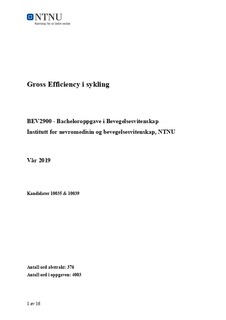| dc.contributor.advisor | Skovereng, Knut | |
| dc.contributor.author | Lilaas, Håvard & Ritman, Tobias Elvevold | |
| dc.date.accessioned | 2019-09-19T14:01:50Z | |
| dc.date.available | 2019-09-19T14:01:50Z | |
| dc.date.issued | 2019 | |
| dc.identifier.uri | http://hdl.handle.net/11250/2617810 | |
| dc.description.abstract | Introduksjon: Hensikten med dette studiet var å undersøke hvilken grad GE påvirkes av MF i sykling. I tillegg ville vi se om nivået av aerob kapasitet har en sammenheng med hvordan MF påvirker GE. Hypotesen var at MF vil ha en negativ effekt på GE og nivå av VO2-maks har en sammenheng med dette. Metode: Studiet ble gjennomført på 16 godt trente mosjonister (VO2-maks = 54.37±5.38 ml/kg/1 min). Testene som ble gjennomført var maksimal beinpress, laktatprofil, 6 sekunders sprint, VO2-maks test og en 30 minutters submaksimal-test. Det ble gjennomført en lignende laktatprofil etter dette igjen, men denne gangen til MF. GE ble regnet ut fra VO2 og Respiratory Exchange Ratio (RER). Resultatet: GE ble redusert under MF sammenlignet med uthvilt tilstand. Det var ingen sammenheng mellom VO2-maks og nedgang i GE under MF. Diskusjon: Forskjellen i GE er sammensatt av flere faktorer som kan påvirke resultatene våre, blant annet teknikk, væskesammensetning og muskelfibersammensetning. Konklusjon: Dette studiet konkluderer med at GE vil gå ned som følge av MF. Vi kan ikke konkludere med at nivået av VO2-maks ikke har en sammenheng med dette. | |
| dc.description.abstract | Introduction: The purpose of this study was to investigate if gross efficiency (GE) is affected by muscular fatigue (MF) in cycling. We would also see if the level of aerobic capacity correlates to how MF affects GE. The hypothesis was that MF will have a negative effect on GE and the level of VO2-max is a cause of this. Method: The study was conducted on 16 well-trained hobby cyclists (VO2 max = 54.37±5.38 ml/kg/1 min). The tests performed were maximal leg-press, lactate profile, 6-second max sprint, VO2-max test and a 30-minute submaximal test. A similar lactate profile were followed after this, but this time to MF. GE was calculated from VO2 and Respiratory Exchange Ratio (RER). Results: GE was reduced during MF compared to rested state. There was no correlation between VO2-max and decrease in GE during MF. Discussion: The difference in GE is composed of several factors that can affect our results, including technique, fluid composition and muscle fiber composition. Conclusion: This study concludes that GE will decline because of MF. We cannot conclude that the level of VO2-max is related to this. | |
| dc.language | nob | |
| dc.publisher | NTNU | |
| dc.title | Gross Efficiency i sykling | |
| dc.type | Bachelor thesis | |
